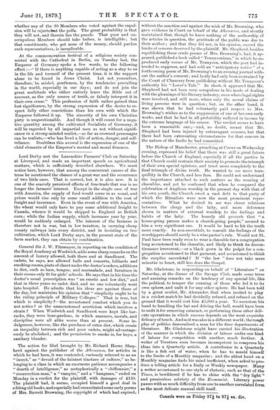The Bishop of Manchester, preaching at Crewe on Wednesday evening,
expressed his belief that there was still a great future before the Church of England, especially if all the parties in that Church could restrain their anxiety to promote the triumph of their own special opinions, and trust more completely to the final triumph of divine truth. He wanted to see more tran- quillity in the Church, and less fuss. He could not understand the importance attached to such matters as the wearing of chasubles, and yet he confessed that when he compared the celebration of Anglican worship in the present day with that of his own youth, the Church owed a vast debt to that party of which the Ritualists were now the most prominent repre- sentatives. What he desired to see was closer relations between the clergy and the laity, and more deference shown in matters of external worship to the feelings and habits of the laity. The homely old proverb that " a house-going parson makes a church-going people," seemed to him a very significant one. It would be hard to bit the truth more exactly. In non-essentials, to consult the feelings of the worshippers should surely be a wise pastor's rule. Would not St. Paul have been ready even to wear a chasuble for a congregation long accustomed to the chasuble, and likely to think its discon- tinuance irreverent,—or a black gown in the pulpit for a con- gregation accustomed to that garment, and accustomed to think the surplice sacerdotal ? If " the law " does not take mere minutiae to heart, still less does the Gospel.


































 Previous page
Previous page